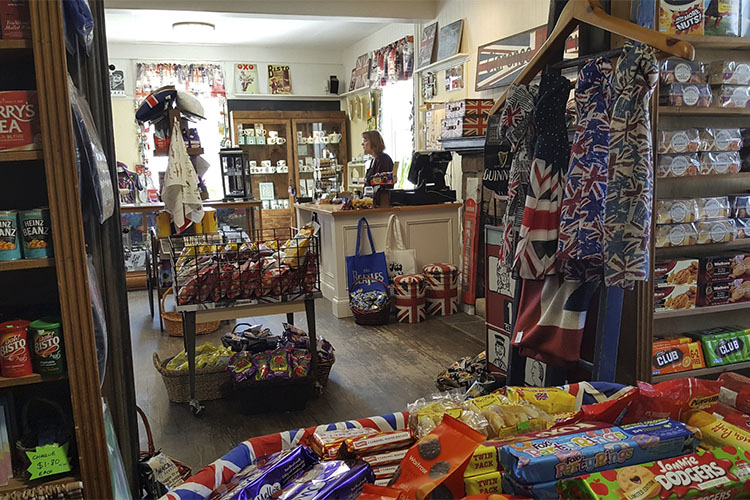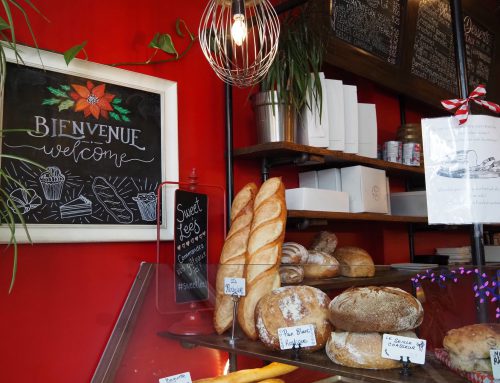BY Skye Legault & Dean Matheos
The G. D’Aoust & Cie department store in Sainte-Anne-de-Bellevue has been around for 120 years, but it had to shut its doors for months during the lockdown.
“The first part [lockdown] in March was actually the first time in 120 years that the store was closed—it has never happened before,” says Cristine Tessier, who is in charge of marketing for the store. “The store has been through the Great Depression, two great wars and it has never, ever shut down. So this was a first time thing.”
As a third generation owned store established in 1900, D’Aoust has been around for a long time. A landmark in the village, they sell clothing, gift baskets, gourmet food, and furniture.
A carriage full of people come to visit the G. D’Aoust & Cie department store in the early 1900s. Photo courtesy of G. D’Aoust & Cie.
Many Québec businesses faced the sad reality of needing to temporarily close their doors during the lockdown.
The inside of the Clarence & Cripps boutique in Hudson, Québec. Photo by Skye Legault.
The closure of non-essential businesses gave online retailers an advantage. This is especially true for U.S. e-commerce giant Amazon, who has gained even more traction as of late. According to an Amazon press release, Amazon opened its first operations facility in Québec in Lachine the summer of 2020 and plans on opening five more facilities by 2022.
A Timeline of Amazon’s progression as a leading e-commerce retailer. Media by Skye Legault.
“Amazon does third party intermediation—this puts them in a powerful position,” says Michael G. Carney, Concordia University Research Chair in Strategy and Entrepreneurship. “Not everything has to go through an Amazon warehouse, they host things.” Hosting products means they can largely eliminate the need for physical infrastructure.
Clarence & Cripps British boutique and tea room was also forced to close for months during the lockdown. Owned by Nicky Fisher and her husband Derek Jones, Clarence & Cripps is a British boutique and tea room in Hudson.
Fisher says they had the option to keep their specialty grocery store section open but decided against it. She saw it as a much needed break and an opportunity to focus solely on curbside pickup and delivery.
“We used to have e-commerce on our website, but the problem is that people think you’re Amazon,” she says. “Customers would order 10 of something that I would have two of and then if they’ve paid for it, you have to deal with the refund or exchange process. Although we do have the website, we don’t sell from the website.”
They built a new website that serves as a gallery of commonly stocked products to give customers an idea of what their store offers. It also includes the restaurant’s menu. Fisher encourages clients to call the store about products they see online so that she can ensure they are in stock for them to purchase. This way, the dilemma that arises with online orders is avoided.
“E-commerce sites like Amazon are definitely affecting local businesses at the moment,” says Milena Stanoeva, Manager of Public Affairs at the Canadian Federation of Independent Business (CFIB). “E-commerce and big-box stores are able to stay open, but then smaller shops and clothing stores selling the same things cannot.”
An Amazon Prime package dropped off at a front door. Photo by Skye Legault.
According to Carney, Amazon has an advantage in that it offers a wide selection of products, making it an ideal one-stop shop for consumers.
“They can reach a huge amount of fairly specialized markets selling all kinds of things that are difficult to acquire,” he says.
Québecers turning to e-commerce stores for their non-essentials and to minimize contact with others in response to COVID-19 has only increased Amazon’s popularity.
According to a report by Deloitte, Canadian consumers’ preferences and expectations for delivery have increased, although their willingness to pay for shipping has dropped.
More than 150,000 local Canadian retailers have gone online with their stores since the start of the pandemic, according to the Canadian Federation of Independent Business (CFIB).
Like many other stores, D’aoust decided to go online after seeing the effects of the first provincial lockdown.
“When we did reopen again [in March], we thought, ‘Okay, this time we’re taking another step and we’re going online as well’,” says Tessier. “So this century old store went online.”

Many local retailers have opened online shops to keep up with competing e-commerce sites like Amazon. Photo by Dean Matheos.
With around 40,000 different items in the store, opening up an online shop was a complex task. They decided to start by putting the gift store online as it has seasonal products that are easy to shop for, and don’t require the ‘trying on’ that clothes would.
“We’re using Canada Post for now and customers get free shipping over $100,” Tessier says. “With Canada Post, it’s really expensive to ship and for a smaller store—the smallest box starts at $13.”
Figuring out a difficult delivery system also posed a challenge to Fisher during the pandemic.
“We have always offered free delivery for Hudson because we live in the area, but most of the deliveries were for the West Island or Montréal,” she says. “If it was Vaudreuil or Rigaud we would deliver it ourselves, but further afield it gets a little harder, especially when you go more towards Montreal.”
In terms of retail, Carney predicts Amazon will only get bigger from here. “We’ve seen this massive switch, how streets have been closed around the world now for the better part of the year and most of that is tailored to these platforms [e-commerce],” he says. “There are small attempts to compete against this by local retailer’s kind of aggregating to provide a comparable service, but it doesn’t have all of the factors like the long tail, the variety of the products, and just the sheer competitiveness of their own imitation branded products.”
Even as restrictions ease and stores reopen, some worry that things will never be the same for local businesses.
“Our main concern is that the e-commerce trend, like with Amazon, will permanently alter the way Canadians consume even once the pandemic is over,” says Stanoeva.




